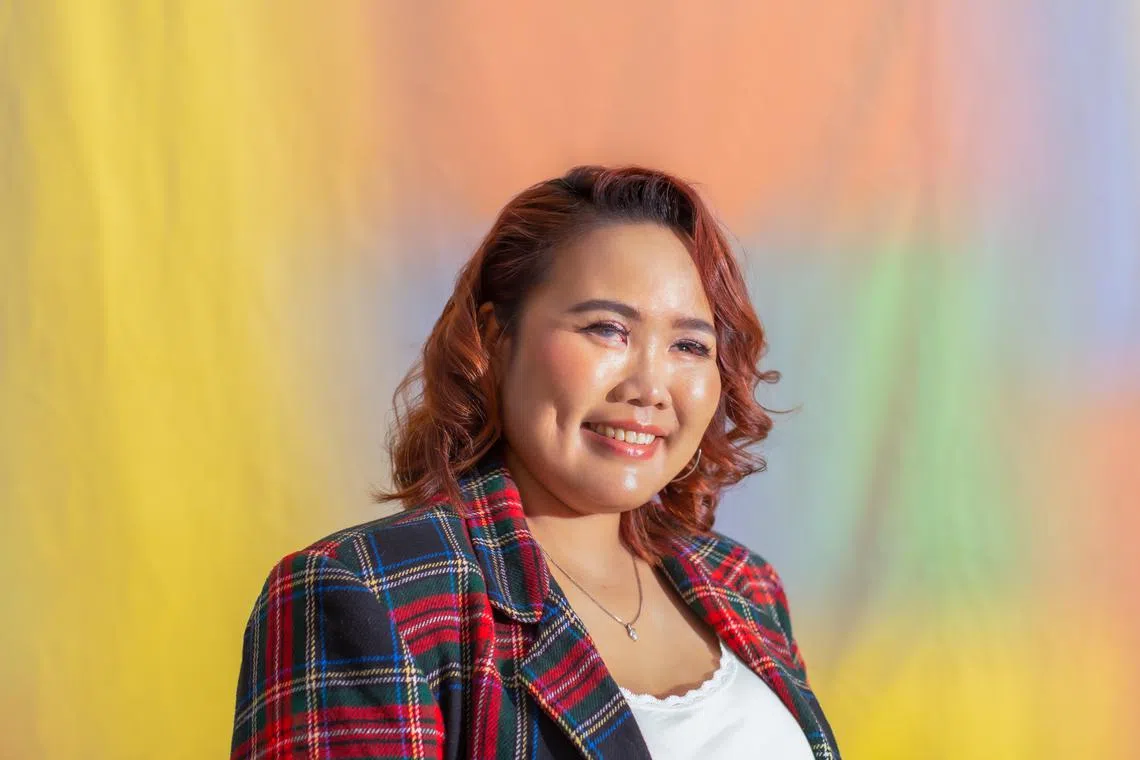Finding love is tough and for people with disabilities, more barriers stand in the way
Sign up now: Get ST's newsletters delivered to your inbox

Born with a rare eye condition, Ms Norliana Mohamed Ajam hopes to find love despite setbacks.
PHOTO: SHENTONISTA
SINGAPORE – Like many people, Ms Norliana Mohamed Ajam hopes to settle down with that special someone one day – even if she has had three relationships that did not work out.
But the search for love has not been easy for the 40-year-old, who was born with a rare eye condition – uveitis, or eye inflammation. She is blind in her left eye and partially blind in her right one.
“People have said to me, ‘You are blind. Why should you be in a relationship?’” said Ms Liana, who works as an exhibition guide.
While efforts from self-help groups and organisations, such as SG Enable,
“I think many of them are slowly beginning to feel more empowered as society is starting to become more inclusive of them,” said psychologist Ooi Sze Jin, who founded a mental health clinic, A Kind Place, in 2021.
However, some of her clients with disabilities have shared with her that it can be challenging to get people to accept who they are. Some men also worry about not being able to fill the typical “masculine male” role and physically care for their partners, she added.
Some PWDs may not fully understand the difference between someone showing love, and someone looking just for sex, said Ms Ooi, with many of her clients getting sexually abused or emotionally hurt.
In addition, family members of potential partners may not approve of relationships involving a person with disabilities.
“Sometimes, parents and friends worry about their children or friends who are differently abled, and might just try to set them up with anyone or want them to just accept anyone who fancies them,” Ms Ooi said. “People who are differently abled need to be able to choose who they want to date.”
Charity organisation SPD’s senior social worker Angela Chung added that PWDs may have smaller social circles than others, while some may be more preoccupied with ensuring financial self-sufficiency or managing health problems, limiting their capacity to consider romantic relationships.
Something as simple as going on a date involves extra effort for potential suitors, such as making sure they are going to barrier-free places if their partner is using a mobility device.
Help exists, where Cupid’s arrows have gone off target.
For example, apart from mental health services, A Kind Place provides training and workshops for those with special needs on social communication skills. It also teaches PWDs about different types of relationships and how to interact with others.
The Disabled People’s Association had the DisOrdinary Love programme between 2019 and mid-2023, with the aim of educating PWDs in sex and relationships through workshops.
PWDs are also brought into the mainstream through initiatives such as Our Grandfather Story’s Love Enabled. The six-part docu-series, which ran online in 2023, featured three PWDs including Ms Liana as they navigated the dating scene in Singapore.
Even though relationships for PWDs may involve tough considerations and barriers, it is possible for them to find love, said Ms Chung of SPD.
Mr Bjorn Ng, for example, met his girlfriend while taking a common module in his first semester in Nanyang Technological University. They have been together for three years.
The 25-year-old, who is autistic, said it is challenging for him to interpret most implicit social cues, such as the boundaries of platonic and romantic behaviour. He has learnt to conduct himself in social and romantic settings through trial and error and with help from his girlfriend, who is able-bodied.
Another PWD who has found love is Mr Shalom Lim, who has Duchenne muscular dystrophy, a rare disease which causes the progressive loss of muscle. The 28-year-old met his able-bodied girlfriend at an arts workshop and the couple have been dating for more than eight months.
He said his condition helps him appreciate the importance of cultivating a long-lasting emotional connection with his partner.
“I believe what binds lovers to be faithful to the very end is the mutual trust and commitment they share with each other,” said Mr Lim, an executive for a charity organisation.
Meanwhile, Ms Liana has not given up hope of finding love again. She has also not let her eye condition hold her back from living her life fully. She is a national player for goalball, a team sport designed for the visually impaired, and is part of a dragon boat team.
“We do have feelings. We do have emotions and we are as normal as other human beings. The only difference is we have disabilities. That’s it,” she said.
“We are just like you.”



